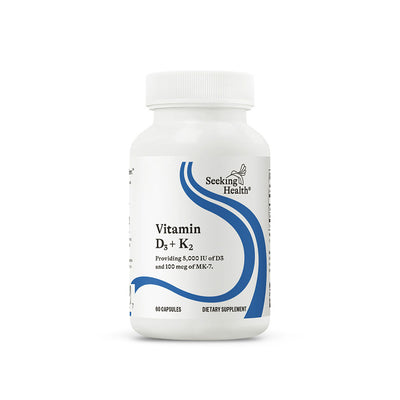TL;DR: If you're feeling worse after taking folate or methylation supplements like methylfolate or methylcobalamin, it may be due to excessive methylation, especially if you have an MTHFR mutation. Overmethylation can cause issues like neurological symptoms, abnormal inflammatory responses, and gene silencing. A balanced diet, reduced methionine intake, and careful use of supplements like vitamin B6, magnesium, and niacin under the guidance of your healthcare professional can help support balance. Always consult a healthcare professional to tailor strategies to your needs.†
What Should You Know About MTHFR and Folate Supplementation?

If you’ve been feeling worse after taking folate, you’re not alone. If you have an MTHFR gene mutation, especially if it’s homozygous (inherited from each parent) and elevated homocysteine levels, you may turn to supplements like methylfolate for support. However, doing so may cause adverse reactions. This may seem counterintuitive since these supplements are supposed to help you and support your health and well-being.†
The key to understanding these reactions lies in the complexity of your individual biochemistry. If not managed correctly, increased methylation in your body may lead to neurological symptoms and cause a whole host of adverse effects.
What Adverse Effects Can Increased Methylation Cause?

Methylation is a vital biochemical process where small chemical groups called methyl groups are added to different parts of the body, such as DNA, influencing how genes function without altering the DNA itself. However, excessive methylation can lead to a range of health issues, including:1,2
- Uncontrolled cell growth, which may cause serious health problems.3
- Brain changes that affect memory and behavior.4
- Autoimmune responses, where your immune system mistakenly attacks your own body.
- Heart and cardiovascular complications.5
- Bone weakening, increasing the risk of fractures.
- Gene silencing, turning off critical genes necessary for proper function.
- Inflammation, contributing to numerous health conditions.
Increased methylation may also negatively impact neurotransmitter production, such as dopamine, norepinephrine, and serotonin while increasing acetylcholine. During methylation, S-adenosylmethionine (SAMe) plays a key role, and its overproduction can trigger symptoms, including the following:6,7
- Tremors and inexplicable shaking.
- Skeletal rigidity.
- Hypokinesia and the slowing and decreasing of body movement.
This is why understanding and maintaining balanced methylation is crucial to supporting your overall health.
Can Your Diet Affect Methylation?

Yes, your diet can also impact methylation.
Foods high in methionine convert into SAMe, which could contribute to heightened symptoms. Adding folate may exacerbate your symptoms if your body is already producing too much SAMe.
The following foods high in methionine include:8
- Red meat: Beef and lamb
- Pork
- Fish and shellfish
- Turkey
- Cheese
- Eggs
- Soy products
- Dairy products
- Nuts
- Beans
While these foods are high in methionine—an essential amino acid—excessive consumption may have health implications. The recommended daily allowance of methionine for an adult is 13mg/kg of body weight. A balanced diet is key to maintaining proper nutrition and health.
Remember, the exact methionine content can vary depending on factors like preparation method and serving size.
How Do You Balance Methylation?

If you or a loved one are struggling with these challenges, here are some actions to discuss with your healthcare professional to support wellness and methylation balance.:
- Avoid high-methionine foods: Temporarily reduce your intake of methionine-rich foods to prevent excess SAMe production.
- Pause folate and B12 supplementation: Certain prescription medications that contain folate, as well as over-the-counter supplements like methylfolate and methylcobalamin, may need to be paused under the direction of your healthcare professional.
- Incorporate these supplements from Seeking Health™ to lower homocysteine into your diet:
- P-5-P (Pyridoxal 5-Phosphate) helps lower homocysteine and converts it into vital nutrients such as taurine, cysteine, sulfate, and glutathione. These nutrients are essential for healthy neurological function and the body’s normal protection from oxidative damage. A deficiency in active vitamin B6 may explain some of the symptoms you're experiencing.†
- Magnesium Plus combines active vitamin B6 and magnesium, which may further support this process. Consider consulting your healthcare professional to determine the appropriate dose.†
- Niacin: A small dose of niacin (20–50 mg, 2-3 times daily) can help by "eating up" the excess methyl groups that might be causing your homocysteine imbalance. You may find support by including niacin as part of your regimen for temporary methylation balance.†
These recommendations should be tailored to your unique healthcare status, and it’s wise to consult a healthcare professional who’s well-versed in MTHFR and methylation issues. Testing for MTHFR mutations in your family members can also provide critical insight, especially if you’re planning for pregnancy.
When the body’s methylation pathways are brought back into balance, introducing supplements from Seeking Health like L-Methylfolate or specialized formulas such as Homocysteine Nutrients may eventually become beneficial. But it’s essential not to rush this process until other underlying imbalances are addressed.†
In a Nutshell:
- Eliminate methionine-rich foods temporarily.
- Discuss pausing folate, B12, and other methyl supplements with your doctor.
- Use P-5-P (Pyridoxal 5-Phosphate) and Magnesium Plus from Seeking Health to support homocysteine balance effectively.†
- Add low-dose Niacin to support methyl group balance.†
- Work closely with a knowledgeable healthcare provider to fine-tune your supplementation strategy.
You may notice meaningful improvements in your wellness by addressing these steps systematically and paying attention to how your body responds. While these insights may not solve every challenge, understanding and adjusting the biochemistry of MTHFR mutations can make a big difference in your health. Always work with a trusted doctor or specialist to ensure safe and effective changes, as there’s no one-size-fits-all solution—but with the right care, balance is possible.
Why Are B6 and Glutathione Important?

Vitamin B6, specifically in its active form (pyridoxal-5-phosphate), is crucial for converting homocysteine into essential compounds like glutathione, which has antioxidant properties.9 These nutrients help support your body’s natural protection of neurons from oxidative stress and support proper neurological function.10 If you suspect a mutation might be limiting your body’s ability to convert inactive Vitamin B6 (pyridoxine HCl) into its active form, addressing this deficiency could provide significant relief.†
The Bottom Line

Balancing methylation is essential for overall health, especially for individuals with MTHFR mutations. Suppose you’re experiencing adverse reactions to folate or methylation supplements. In that case, it’s important to understand the complex interplay of your diet, genetics, and biochemistry. Adjusting your intake of methionine-rich foods, pausing certain supplements, and incorporating supportive nutrients like Vitamin B6, magnesium, and niacin under professional guidance can help support balance. Always work closely with a knowledgeable healthcare provider to create a personalized plan, as the path to staying healthy is unique for everyone. You can effectively manage symptoms and support your body’s natural processes with the right approach.†

References:
- https://pubmed.ncbi.nlm.nih.gov/37960352/
- https://pubmed.ncbi.nlm.nih.gov/31284823/
- https://pubmed.ncbi.nlm.nih.gov/22430797/
- https://pubmed.ncbi.nlm.nih.gov/30094804/
- https://pubmed.ncbi.nlm.nih.gov/17444888/
- https://pubmed.ncbi.nlm.nih.gov/36359835/
- https://pubmed.ncbi.nlm.nih.gov/30622680/
- https://pubmed.ncbi.nlm.nih.gov/30094804/
- https://pubmed.ncbi.nlm.nih.gov/16424114/
- https://pubmed.ncbi.nlm.nih.gov/19515736/
† These statements have not been evaluated by the Food and Drug Administration (FDA). This product is not intended to diagnose, treat, cure, or prevent any disease.












